It’s a debate that’s been going on since Android came onto the scene: Does simple use of the Linux kernel qualify an operating system to be a bona fide Linux operating system?
Several weeks back I came across some stats on operating system usage that showed Linux use at 3.08%, which is actually a pretty large number for Linux historically, so I wrote an article about it on July 13. After it was published, I did my usual shtick and posted a link to it on my favorite social platform, which is Mastodon.
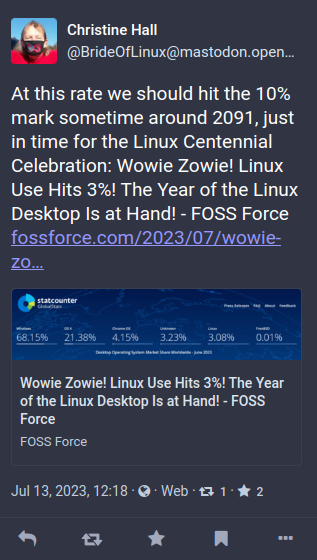
In addition, I posted the same toot (that’s what tweets xeets are called on Mastodon) to other social sites, including the site that two weeks ago we called “Birdsite.”

Actually, I stole the idea for the article from something that Bobby Borisov had published four days previously on Linuxiac, in which he talked about desktop operating system usage numbers he’d found on StatCounter’s website. According to the research, Linux is in fifth place, ahead of last place FreeBSD and behind fourth place “Other,” which bests Linux by a narrow 0.15%.
It’s never a good sign when your favorite anything falls behind “other.”
Topping StatCounter’s list are the usual suspects: Windows, OS X (which I swear I think is now called macOS), and ChromeOS, respectively.

Later that same day, tech writer and open-source advocate Steven J. Vaughan-Nichols published his own take on StatCounter’s study on ZDNET, and I tooted a link to that too.
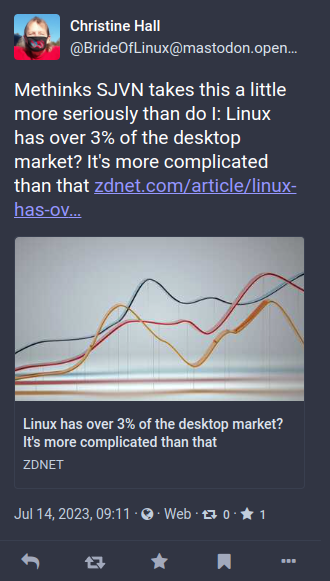
The inclusion of ChromeOS, separate from Linux, became the discussion of the day in the threads that attached to those two toots, with Stefano Maffulli, executive director of Open Source Initiative, chiming in early with a philosophical question.
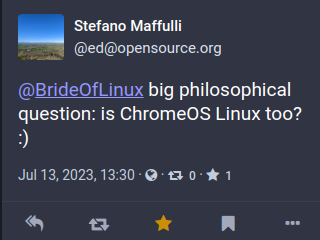
Dana Blankenhorn posed the same question, but being a no-nonsense financial reporter, did so without the philosophical bent (and also without the smiley face, because no-nonsense financial reporters don’t do smiley faces).
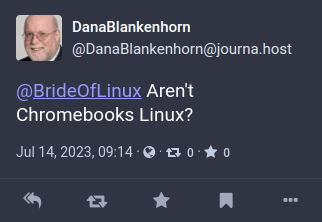
To which I replied, mainly to Maffulli since Blankenhorn hadn’t posted his reply yet, that ChromeOS is both Linux and not Linux, my standard Schrodinger’s cat answer to the question.
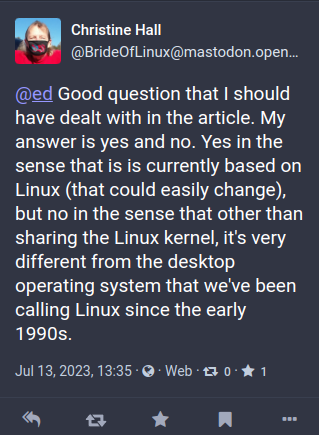
Canadian detlatux joined the discussion, and decided to get all technical about it, which is something Canadians sometimes do.
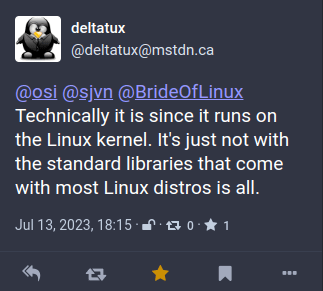
Larry Garfield was like, “Harumph, I thought I ‘splained all of this back in 2021. Weren’t you guys paying attention?”
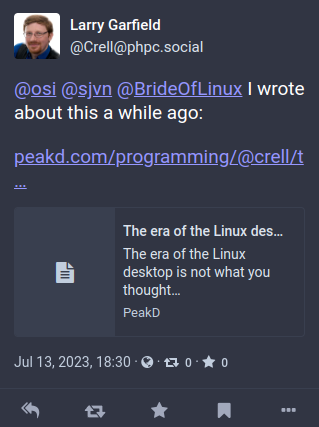
“Wait a minute,” Bjoern Michaelsen, a founder and director at The Document Foundation interrupted. “As Bill Clinton might say, ‘It depends on what your definition of “desktop” is.'”
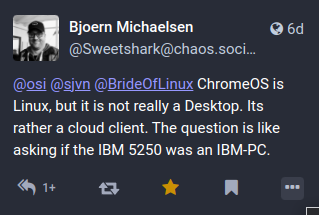
Which excited Maffulli, because it reintroduced philosophy into the discussion.
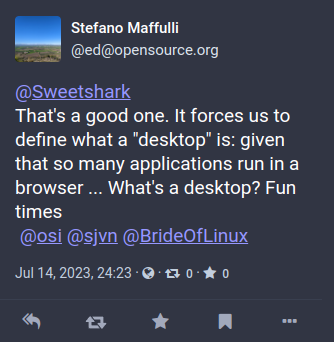
Travis Newton, CTO at NodeSpace Hosting offered proof, in the form of a link to a The Chromium Projects web page that says, “Chromium OS uses the Linux Kernel.”
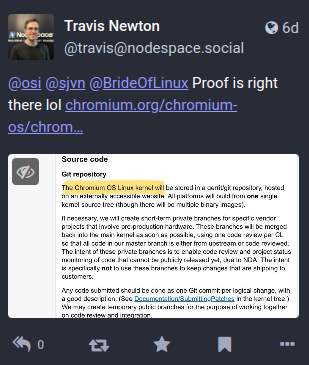
Which was about the time that Simon Phipps, among other things a former president and the current standards and policy director at OSI (and also a notorious Chromebook user), piped in to say, “But…but…but, I run at least three ‘Linux’ apps on my Chromebook, doesn’t that make it Linux?”
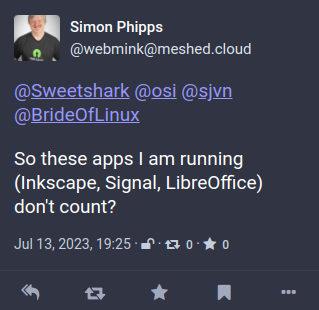
Of course, all three of those apps have also been ported to Microsoft’s operating system, and I don’t think anyone would claim that makes Windows a Linux operating system.
SJVN, who’s been unapologetically using ChromeOS since about the time of its first release, also chimed in on a couple of occasions, mostly to predict that good ol’ fashioned desktop Linux will eventually be one of two desktop OSes left standing.
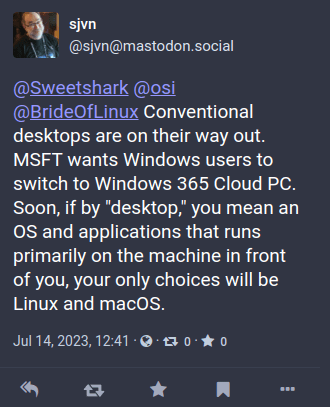
In the end, somebody at OSI, probably Maffulli but possibly Phipps, put up a poll. According to voters, ChromeOS is not a Linux desktop.
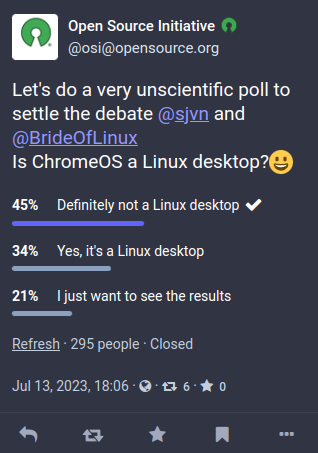
Google probably doesn’t care what you call it.
Christine Hall has been a journalist since 1971. In 2001, she began writing a weekly consumer computer column and started covering Linux and FOSS in 2002 after making the switch to GNU/Linux. Follow her on Twitter: @BrideOfLinux





It looks like people are confused about the difference between a kernel, an operating system, and a desktop. My guess would be that a lot of these journalists never built a Linux distro from source (LFS, Gentoo).
The kernel delegates resources to users and programs. Some driver support is built into monolithic kernels. If a kernel is doing it’s job well, nobody should notice it.
The operating system starts with the kernel and includes the additional programs that users interact with, such as Busybox (which is missing from Android and ChromeOS). This is why Richard Stallman insists on calling the operating system GNU/Linux.
The desktop is something that sits on top of a window manager / composter, on top of an init system going back to the kernel. Remember when DOS needed to be installed before Windows 3.1 could be added on top of it? Same thing on the Linux side. Reasonably, you can start the Chrome browser in full screen mode using .xinitrc from your home directory on any Linux distribution and nobody would know the difference. What Google avoided was the encumbrances of GPLv3 licensing by stripping out Busybox (It can be reinstalled though).
So, are Android and Chrome Linux? Yes to kernel, Not Applicable to OS, Not Applicable to desktop. Linux is a kernel, not an OS.